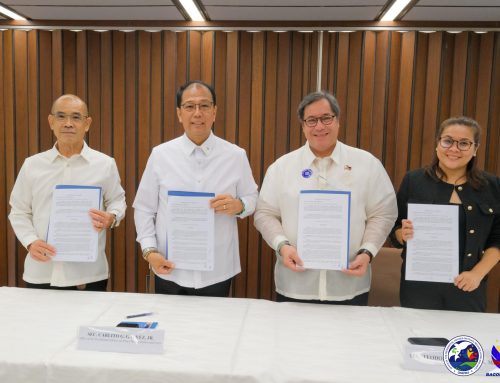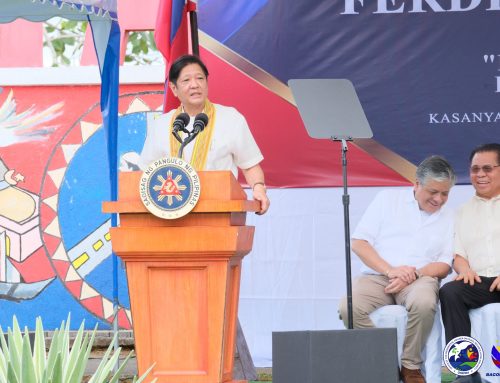PASIG CITY – The nation’s history bears witness how each milestone in the Philippine peace process was achieved because of the major contributions of women advocates whose goal was to bring genuine and lasting peace to their communities.
From the highlands of the Cordillera to the sprawling flatlands and islands of the Bangsamoro region, these extraordinary women have demonstrated that tribe, culture nor religion would not be a barrier towards forging peace, mutual understanding and solidarity among their people.
The mediators in Cordillera
The call for genuine peace and autonomy in the Cordillera began when the Lumbaya Company, known to be the most-equipped armed unit of the Communist Party of the Philippines – New People’s Army – National Democratic Front of the Philippines (CPP-NPA-NDFP) in the region, decided that armed rebellion was not the answer to the challenges confronting the Cordillera.
In 1986, the group broke away from the CPP-NPA-NDFP and created the Cordillera Bodong Administration-Cordillera People’s Liberation Army (CBA-CPLA). The group would later sign a peace agreement with the government now known as the Mt. Data “SIPAT” Peace Accord.
Over the last 34 years, the CBA-CPLA has worked hand-in-hand with the government in completing the implementation of the SIPAT Agreement. Juanita Chulsi, one of the group’s elders, recalled how women served as mediators during the crucial stages of the peace negotiations.
“Kung wala kaming mga babae, napakalaki ng pwedeng mangyari..dahil kung minsan, ang mga lalaki nakakagawa ng drastic decisions. Pero kaming mga babae ang nagnu-neutralize,” Chulsi said.
“Kahit sa mga usapin ng aming tribo, kung may mga decision na papunta na sa tribal war, hindi ‘to natutuloy dahil andito kaming mga babae para mag-hardline na kailangan pa rin ng peace,” she added.
Transformation of women warriors to agents of peace
Meanwhile, in Western Visayas, the stories of Veronica “Ka Inca” Tabara and Jessie “Ka Bebeng” Batoy stand out. These women have shown that those who once took up arms against the government can also be the same people to advocate for peace.
These women are members of the Rebolusyonaryong Partido Manggagawa-Pilipinas/Revolutionary Proletarian Army/Alex Boncayao Brigade-Tabara Paduano Group (RPM-P/RPA/ABB-TPG), a rejectionist group of the CPP-NPA-NDFP based in the Negros and Panay Island.
“Galing kaming armadong rebelde at hindi namin kabisado ang pangkabuhayan. So, sa tulong ninyo (government), at sa bahagi namin, magsusumikap kami na sa abot ng aming kakayahan, ay tuloy-tuloy naming makamit ang pagbabago, kapayapaan, at kaunlaran nang hindi gumagamit ng marahas na paraan,” Tabara said.
For her part, Batoy shared how she was able to return to peaceful, civilian life after the 2000 Peace Agreement was forged between the RPM-P/RPA/ABB-TPG and the government.
“Noong 2013, may mga taga-DENR (Department of Environmental and Natural Resources) through the National Training Program ang rumesponde sa pangangailangan namin. Kaya may mga kasamahan kami ngayon na naka-employ as forest guards, may mga nagsasaka na, at unti-unti, nakapag-pundar kami ng truck, motor, handset radio, hanggang sa makapag-tayo kami ng restaurant,” she recounted.
“Masaya. Masayang maramdaman namin na na-concentrate kami sa legal na pamumuhay at paano mamuhay na mapayapa at maunlad. Na may kakainin kami araw-araw,” Batoy added.
Women in the Bangsamoro peace process
Down in the southern part of the country, the realization of the Bangsamoro people’s decades-long aspiration for self-governance is turning a once underdeveloped, conflict-ridden area into a thriving trade, investment and tourism hub.
The passage of the Comprehensive Agreement of the Bangsamoro (CAB) between the Government of the Philippines and the Moro Islamic Liberation Front (MILF) in 2014 is said to have been a major turning point in the region’s dramatic transformation.
The implementation of the CAB’s political and normalization tracks is helping former Moro Islamic Liberation Front (MILF) combatants return to mainstream society, while transforming their camps into peaceful and progressive communities.
Many believe the approval of the CAB and the ratification of the BOL would not have been possible without the intervention of women negotiators who made sure the GPH-MILF peace talks were on track, while addressing the myriad issues that arose during the discussions.
“Peace negotiation is teamwork. No single woman, no single man can do it alone. It involves a lot of effort,” said Professor Miriam Coronel-Ferrer, the first female chief negotiator and former chair of the Government Negotiating Panel with the MILF in an interview six years ago.
“I think it’s very clear that the agenda of advancing women, peace and security is still at an uphill time. It’s not easy. You have to break barriers. You have to break stereotypes,” Coronel-Ferrer said.
“You have to make people be able to listen and put women in the process so that this perspective, these concerns will be fully acknowledged and realized,” she added.
Years later, the GPH negotiating panel’s hard work would pay off with the passage of the BOL, paving the way for the establishment of the Bangsamoro Autonomous Region in Muslim Mindanao (BARMM) and its interim government, the Bangsamoro Transition Authority (BTA).
Among the major beneficiaries of these landmark developments are the MILF combatants and their families who are now beginning to reap the dividends of peace and development in their communities.
Sixty-two year-old Linda Gumes, the wife of a former combatant, shared how their lives have started to improve after her husband underwent the decommissioning process under the CAB’s normalization track.
“Dati, napakahirap dahil di kami makatulog sa sarili naming bahay dahil nauulanan kami ng bala. Ngayong nasama kami sa decommissioning, nagtitiwala kami na ito ay para din sa Bangsamoro,” Gumes said.
“Sana gumanda na ang pamumuhay naming at paghahanap buhay, makulangan na ang mga alalahanin sa buhay. May mga apo na kami at Alhamdulillah, hindi na nila maranasan yung pagbabakwit na naranasan namin noon,” she added.
A woman leads local peace engagements in ZamPen
Alias “Karen” was only a second year college student in Zamboanga in 2011 when she was approached by the CPP-NPA. After being promised a scholarship, it did not take long for her to join the rebel movement and was soon organizing youth-led activities for the insurgents.
Like other new recruits, Karen was indoctrinated into the Reds’ ideology. She was convinced by the rebels that they needed her help so they could “save the Filipiono people from government’s oppression.” For them, the government was the enemy.
For years, Karen believed that what she was doing was for the good of the country. But the lack of food and sleep in the mountains, aggravated by a life of being on the run from authorities, made her realize that armed struggle was meaningless.
She decided that it was time to leave the rebel group and return to her family.
In 2019, Karen turned herself in to government forces in Zamboanga. She did not waste time and immediately led peace dialogues with CPP-NPA members in the area, resulting in the surrender of over 50 of her comrades in December 2019.
“Bilang isang lider at bilang isang babae, ngayong International Women’s Month, isinusulong natin ‘yung karapatan bilang isang babae— na hindi tayo nasa bahay lang,” Karen pointed out.
“Marami tayong puwedeng gawin sa lipunan. Kung gusto ng isang babae na maging Presidente, puwede ‘yang gawin,” she added.
Currently a single mother with a five month-old daughter, Karen looks to the future with excitement and optimism. She believes that her peace advocacy will not only benefit her child, but also the generations to come.
“Kaya ng isang babae na magsulong ng edukasyon, kalusugan, kapaligiran at kapakanan ng ating mga kabataan. Maging aktibo tayo sa ating pamayanan. Kung ano ang kaya ng mga kalalakihan, kaya rin natin,” she said.
Women in social healing and reconciliation
As the national government carries out its rehabilitation and recovery efforts in Marawi City, it recognizes the crucial role of women in promoting the culture of peace, reconciliation and unity in communities affected by the siege.
Among these women peace advocates is Jaslia Abbas who was caught in the crossfire when the Daesh-inspired Maute group attacked the Islamic City on May 23, 2017.
Abbas, who now works as an internally displaced person (IDP) leader at the Sarimanok Tent City, shared how she was able to change mindsets and in the process, earn the respect of her fellow IDPs, especially the male ones.
“Masyadong magulo noon kasi hindi pa kami magkaka-kilala noong time na ‘yon. ‘Yung mga lalaki sa amin, mga bugnutin so minsan kapag nagaaway-away, kaming mga babae ang umaawat sa kanila,” she recalled.
“’Yon ang nagbigay sa akin ng lakas ng loob para maging leader. At bilang isang leader, nandoon ang pagiging masipag at pasensyosa ko kahit awayin nila ako, tinitiis ko,” Abbas said.
To help residents recover from the trauma caused by the incident, the Armed Forces of the Philippines (AFP) and the Philippine National Police (PNP) Civil Relations Committee created an all-women group of soldiers and police officers called the “Hijab Troopers.”
The members are called such because they are garbed in white hijbas, the traditional veil worn by Muslim women as a sign of modesty. But beyond its traditional meaning, the white hijab is considered a symbol of respect for the Islam faith.
The Hijab Troopers has been tasked to support the overall recovery, reconstruction, and rehabilitation of Marawi. Specifically, it provides psychosocial healing services to residents in partnership with national line agencies agencies and civil society organizations.
“’Yong best experience ko as a Hijab Trooper is siguro ‘yong makita kami ng mga magulang at bata na may impression sa kanila na may magandang mangyayari ngayon, at magsabi sila ng ‘Ate, thank you’, ‘Ate, sana ‘wag na kayo umalis,’” said Sgt. Sharon Flor Larona, a senior member of the Hijab Troopers.
“Ang pagiging isang Hijab Trooper isa ‘yung tinatawag na serving above self. ‘Yung self-fulfillment na hinding hindi nabibili ng pera,” Larona added.
Role of women in peace and security
On October 31, 2000, the United Nations Security Council passed Resolution No. 1325, reaffirming the key role of women in conflict prevention and resolution, peace negotiations, peacebuilding, peacekeeping, humanitarian response, and post-conflict reconstruction.
In the Philippines, the National Action Plan on Women, Peace and Security (NAPWPS) was launched in 2010. The plan contains programs, projects and policies that will allow women to be active participants in the peacebuilding process.
Moreover, the NAPWPS aims to address the plight of women who are situated in areas of armed conflict, and capacitate them to be agents of peace and development.
“WPS does not only recognize the vulnerabilities and multiple burdens of women of all ages in armed conflict situations but also their roles and capacities in the prevention, resolution and transformation of armed conflict,” said Office of the Presidential Adviser on the Peace Process (OPAPP) Director Pamela Ann Padilla-Salvan.
OPAPP serves as the national chair and lead oversight agency of the National Steering Committee on WPS.
Even on the ground, women have taken on multiple roles in peacemaking, peacebuilding and peacekeeping. We contribute in addressing conflict as peace advocates, educators, negotiators, mediators, facilitators, values “formators”, healers and “reconcilers”, evacuation center managers, role models, and relief operations coordinators,” she added.
As the nation celebrates Women’s Month this year, Presidential Peace Adviser Carlito Galvez Jr. underscored how women can help the the government in realizing its mission of achieving a just and lasting peace for all Filipinos.
“The milestones we have achieved in the peace process would not have been realized if not for the unwavering dedication and commitment of women,” Galvez said.
“Truly, women are catalysts of peace and change. OPAPP is committed to support initiatives that would help unleash the potential of women as peace advocates, peacekeepers and peacebuilders,” he added. ###











